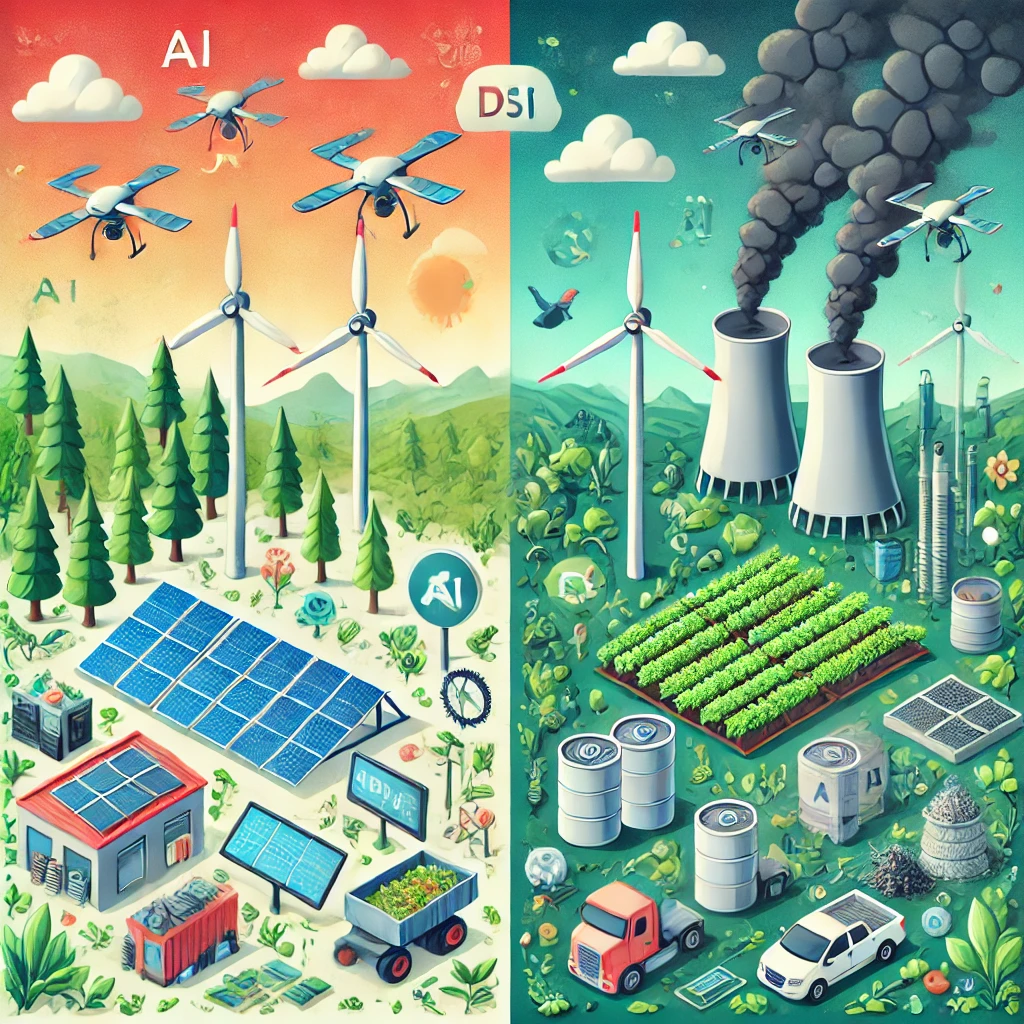
Artificial Intelligence (AI) has the potential to revolutionize various sectors, but it also poses significant environmental challenges. Here’s a look at the positive and negative impacts of AI on the environment.
Positive impact of AI on the environment
Combating climate change
- Optimizing renewable energy: AI optimizes renewable energy production, such as solar and wind power, by predicting demand and adjusting generation in real-time, reducing greenhouse gas emissions.
- Efficient industrial processes: AI identifies ways to make industrial processes more efficient, reducing energy consumption and emissions. For example, AI-driven predictive maintenance can significantly lower energy usage in manufacturing plants.
Sustainable resource ranagement
- Smart water use: AI monitors water consumption in cities and agriculture, identifying leaks and waste, leading to more efficient water management.
- Sustainable agriculture: AI helps farmers optimize the use of water, fertilizers, and pesticides, increasing productivity and reducing environmental impact. For instance, precision farming uses AI to apply water and nutrients only where needed.
Biodiversity protection
- Environmental monitoring: AI-equipped sensors monitor natural environments, tracking endangered species, identifying deforestation areas, and detecting illegal fishing.
- Combating wildlife trafficking: AI analyzes data from wildlife seizures to identify and dismantle trafficking networks, protecting endangered species.
Negative impact of AI on the environment
Carbon Footprint
- Energy-Intensive processes: Training large AI models can produce about 626,000 pounds of carbon dioxide, equivalent to the emissions from 300 round-trip flights between New York and San Francisco.
- Rising emissions: The energy demands of AI models contribute significantly to greenhouse gas emissions. By 2040, emissions from the ICT industry could reach 14% of global emissions.
Electronic Waste Disposal
- Hazardous Chemicals: AI technology generates e-waste containing hazardous chemicals like lead and mercury. Improper disposal can contaminate soil and water.
- Increasing E-waste: By 2050, e-waste generation is expected to exceed 120 million metric tonnes. Effective recycling and management are crucial to mitigate this impact. The Empire State Building weighs around 365,000 metric tonnes. Therefore, 120 million metric tonnes of e-waste is equivalent to about 329 Empire State Buildings. Picture 329 towering skyscrapers filled with electronic waste.
Impact on natural ecosystems
- Automation and consumption: AI-driven automation, such as driverless cars and delivery drones, can increase consumption and waste.
- Agricultural practices: Overuse of AI in agriculture might lead to excessive use of pesticides and fertilizers, harming biodiversity.
Lack of transparency and accountability
- Hidden environmental footprint: The complexity of AI systems makes it hard to assess their full environmental impact. Transparent practices and regulations are needed to ensure accountability.
Ensuring a sustainable future for AI
To reduce AI’s environmental impact, a multifaceted approach is essential:
- Energy-efficient AI: Invest in energy-efficient hardware and algorithms.
- Ethical design standards: Promote ethical AI design, including end-of-life considerations.
- Transparency and accountability: Provide relevant data on AI models and sources, and establish clear standards and regulations.
- Collaboration: Encourage multidisciplinary research and knowledge exchange.
Conclusion
AI offers significant potential for environmental sustainability, but its negative impacts must be addressed. By adopting responsible practices, we can ensure that AI and environmental preservation go hand in hand, balancing technological advancement with ecosystem protection.

